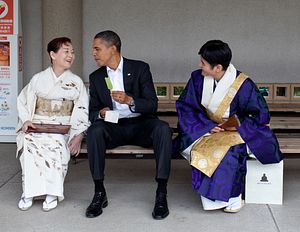The alliance between the United States and Japan is turning out to be one of the more important geopolitical features of the Asia-Pacific region amid China’s rise. Over the past 40 some years, the alliance has been central to Asia’s security architecture. As times change in the region, so has the alliance. Japan, long a pacifist state without much of an interest in military matters, is redefining the role of its Self-Defense Forces following a resolution that now allows the country to exercise the right to collective self-defense. As a consequence of that move, the United States and Japan are revisiting their defense cooperation guidelines — the terms that govern the nature of military cooperation between the two countries.
While we broadly understand how the alliance works on a state-to-state level, there is often less reflection about just how close the United States and Japan are in terms of public opinion. As flourishing democratic societies, the opinions of the broader public have a direct and measurable impact on government policies. A Pew Research study released on April 7 offers the most comprehensive and robust measurement of U.S. and Japanese public opinion as it relates to their broader bilateral relationship and security cooperation in Asia. The picture painted by the report is positive: “About two-thirds of Americans trust Japan a great deal or a fair amount and three-quarters of Japanese say they trust the United States.” Additionally, citizens of both states are commonly skeptical of China’s intentions: “Just 30% of Americans and 7% of Japanese trust China,” the study’s authors note.
I encourage readers to peruse the Pew study’s findings in full as they shed important light on an often overlooked aspect of the U.S.-Japan alliance. I’d highlight a few additional findings from the report that caught my eye. For example, despite a mutual distrust of China, U.S. responders, particularly younger ones, emphasized the necessity of developing a close economic relationship with China over Japan — presumably speaking to the extent to which China is perceived as the prominent Asian economy by many in the United States. (The finding brings to mind a 2011 Gallup public opinion study in which a majority of Americans stated that they believed China was the world’s largest economy.) 23 percent of respondents aged 18-29 stated that it was more important for the U.S. to have close relations with Japan over China while 61 percent said otherwise.
Something else that is curious is the extent to which Americans respondents attributed positive characteristics to Japanese people and Japanese respondents attributed negative characteristics to American people. A whopping 94 percent of American respondents view the Japanese as hardworking, inventive (75 percent), honest (71 percent), intolerant (36 percent), aggressive (31 percent), and selfish (19 percent). Japanese responders, by contrast, were less charitable, with only 25 percent describing Americans has hardworking, 67 percent as inventive, 37 percent as honest, 29 percent as intolerant, 50 percent as aggressive, and 47 percent as selfish. Though these findings likely have little relevance as far the U.S.-Japan alliance is concerned, they present a striking view of a perception gap between the citizens of both these countries.
Another noteworthy finding — though questionably significant — is that while both American and Japanese respondents reported high mutual trust, each group rated Australia as more trustworthy overall. Among Japanese respondents, 75 percent stated they had a “great deal/fair amount of trust” in the U.S. and 78 percent said so for Australia. 68 percent of Americans said the same about Japan and 80 percent about Australia. Japanese Prime Minister Shinzo Abe and U.S. President Barack Obama have been pursuing trilateral cooperation with Australia — a proposition that will surely prove uncontroversial to their domestic audiences if Pew’s results are representative.
A final result worth highlighting is the extent to which U.S. and Japanese respondents disagree about the role Japan’s military should play in regional affairs. 47 percent of Americans would welcome a more active Japanese military role in regional affairs, while only 23 percent of Japanese feel the same way. This finding reveals a disconnect between public opinion and the leadership in Japan. While Prime Minister Shinzo Abe’s government is certainly interested in Japan playing a more active role in regional affairs — what it calls “proactive pacifism” — a large proportion of the public disagrees. Meanwhile, Americans are in line with the Obama administration’s approach, which is to encourage Japan to shoulder more of the burden of its own defense despite its alliance with the United States and the U.S. presence in Northeast Asia.

































